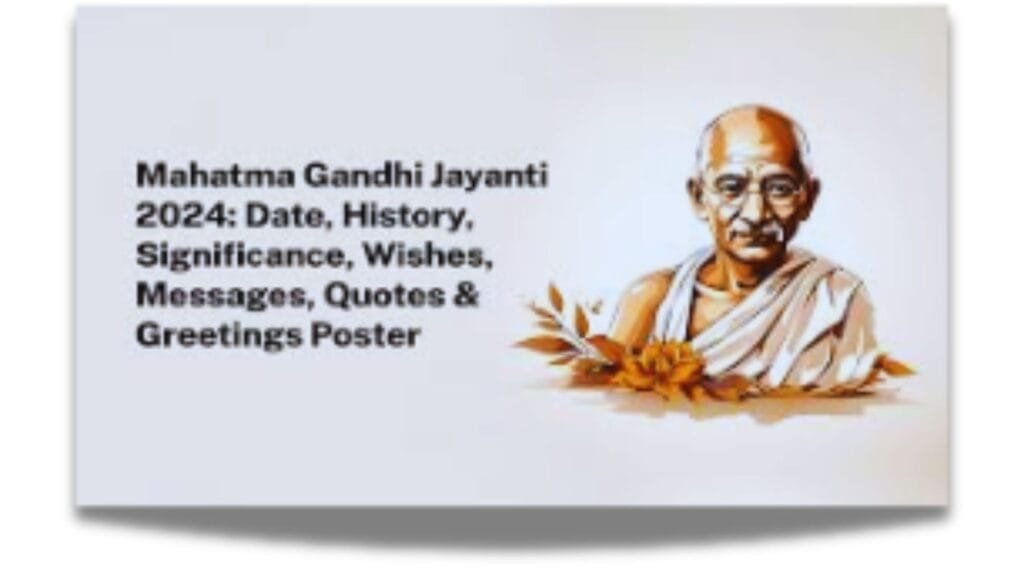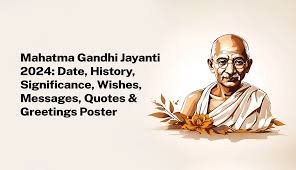Mahatma Gandhi Jayanti, celebrated on October 2nd, is a significant occasion in India and around the world. This day marks the birth anniversary of Mahatma Gandhi, a pivotal figure in India’s struggle for independence and a champion of non-violence and peace. Beyond being a day of remembrance, Gandhi Jayanti serves as a reminder of the enduring principles of truth, justice, and harmony.
Table of Contents

Who Was Mahatma Gandhi?
Mohandas Karamchand Gandhi, affectionately known as Mahatma Gandhi, was born on October 2, 1869, in Porbandar, India. Educated in law in London, he later moved to South Africa, where he first experienced racial discrimination. This pivotal experience ignited his passion for social justice and equality.
Upon returning to India in 1915, Gandhi became a leading figure in the independence movement against British colonial rule. His unique approach, characterized by non-violent resistance and civil disobedience, became a powerful method for achieving social and political change. Gandhi’s philosophy, known as Satyagraha, emphasizes the power of truth and the importance of non-violence as tools for liberation.
The Significance of Gandhi Jayanti
Mahatma Gandhi Jayanti is celebrated as a national holiday in India, honoring the legacy of a man who inspired millions. In 2007, the United Nations declared October 2nd as the International Day of Non-Violence, recognizing Gandhi’s commitment to peaceful conflict resolution.
A Day of Remembrance
On this day, people across India and beyond come together to remember Gandhi’s teachings and contributions. Events such as prayer meetings, discussions, and cultural programs are organized, beginning with a solemn prayer at Gandhi’s memorial in Raj Ghat, New Delhi. Leaders and citizens alike pay their respects, reflecting on his profound impact.
Promoting Non-Violence
Gandhi’s teachings are especially relevant in today’s world, often marred by conflict and division. Observing Gandhi Jayanti serves as a vital reminder to embrace non-violence and promote peace in our communities. It’s an opportunity to reflect on how we can apply these principles in our daily lives.
Key Principles of Gandhi’s Philosophy
Gandhi’s teachings extend beyond politics; they provide a roadmap for living a meaningful and ethical life. Here are some core principles of his philosophy:
1. Ahimsa (Non-Violence)
Ahimsa, or non-violence, is perhaps Gandhi’s most famous principle. He believed that non-violence is the most potent weapon available to oppressed people. Gandhi’s approach teaches us that one can fight against injustice without resorting to violence.
2. Satyagraha (Truth Force)
Satyagraha combines the concepts of truth and non-violence. For Gandhi, the pursuit of truth was essential for achieving justice. He encouraged individuals to stand against injustice while adhering to honesty and integrity.
3. Self-Discipline
Personal discipline was crucial to Gandhi’s philosophy. He practiced simple living, vegetarianism, and celibacy, viewing these choices as pathways to self-purification. His lifestyle reflected his belief that change begins within.
4. Empowerment of the Poor
Gandhi dedicated his life to uplifting the marginalized and empowering the poor. He believed that true independence would come when the weakest members of society were uplifted and allowed to live with dignity.
5. Unity in Diversity
Gandhi’s vision for India included all religions and communities. He promoted the idea of unity in diversity, urging people to respect each other’s beliefs and to live harmoniously.
Celebrating Gandhi Jayanti
Celebrating Gandhi Jayanti involves various activities that reflect his ideals. Here are some meaningful ways to observe this important day:
1. Participate in Prayer Meetings
Many people start the day by attending prayer meetings or commemorative events. This is a time to reflect on Gandhi’s life and teachings, expressing gratitude for his contributions to humanity.
2. Engage in Community Service
Acts of community service embody Gandhi’s principles. Whether cleaning a local park, volunteering at a shelter, or helping those in need, these acts of kindness honor his legacy of service and compassion.
3. Educational Activities
Schools often organize discussions, debates, and essay competitions centered around Gandhi’s life and philosophy. Participating in these events helps spread awareness about his teachings among the younger generation.
4. Promote Non-Violence
Gandhi’s message of non-violence is crucial today. Engaging in conversations about peace and understanding can inspire positive change in our communities. Consider hosting workshops or discussions on conflict resolution.
5. Read and Reflect
Take time to read about Gandhi’s life, philosophy, and works. Books, documentaries, and articles can provide deeper insights into his thoughts and their relevance in contemporary society.
6. Art and Culture
Art is a powerful medium for expression. Organizing or participating in cultural events—such as plays, art exhibitions, or poetry readings that celebrate Gandhi’s life—can creatively honor his memory.
The Global Impact of Gandhi’s Philosophy
Gandhi’s influence extends far beyond India. His philosophy of non-violence has inspired numerous global movements. Leaders such as Martin Luther King Jr. and Nelson Mandela drew from Gandhi’s teachings to combat injustice and promote equality in their own struggles.
A Legacy of Peace
In a world facing numerous challenges, Gandhi’s teachings remind us of the power of peaceful resistance. His emphasis on dialogue, understanding, and compassion can guide us in resolving conflicts and building a more just society.
Conclusion: Carrying Forward the Legacy
Mahatma Gandhi Jayanti is more than a day of remembrance; it is a call to action. It urges us to embody the values that Gandhi championed—truth, non-violence, and service to humanity. As we celebrate this day, let us reflect on how we can integrate these principles into our lives, striving to create a more just and peaceful world.
In the spirit of Gandhi, may we all commit to being agents of change, fostering understanding, and promoting harmony in our communities. Each act of kindness and every effort toward peace contributes to a larger vision of a better world, keeping the Mahatma’s legacy alive for f

